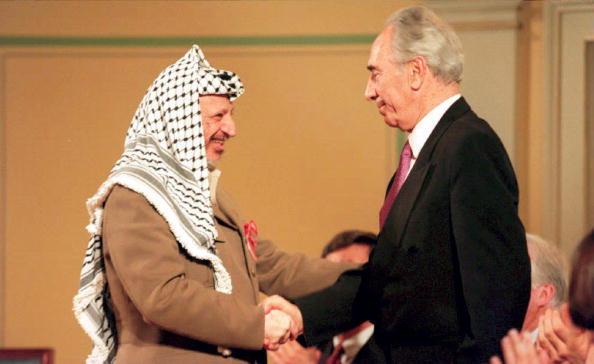Shimon Peres dead: Palestinians react to death of former Israeli president
Former president and prime minister championed peace with Palestinians in the later years of his political career

President of the Palestinian Authority, Mahmoud Abbas, has expressed his "sorrow and sadness" over the passing of former Israeli Prime Minister Shimon Peres, calling him a "partner in making the peace of the brave."
“He exerted persistent efforts to reach a just peace from the [1993 Oslo peace talks] until the final moments of his life,” Abbas said.
In the Gaza Strip, meanwhile, the ruling Hamas militant group described Mr Peres as “the last remaining Israeli official who founded the occupation.”
“His death is the end of a phase in the history of this occupation and the beginning of a new phase of weakness,” said spokesperson Sami Abu Zuhri.
Mr Peres, the last living founding father of Israel, died at a hospital near Tel Aviv early on Wednesday morning due to complications from a stroke.
Tributes to the elder statesman of Israeli politics, who was jointly awarded the 1994 Nobel Peace Prize for signing the Oslo peace accords as foreign minister with Palestinian Liberation Organisation (PLO) leader Yasser Arafat, have been pouring in from all over the world.
“He was a genius with a big heart who used his gifts to imagine a future of reconciliation not conflict, economic and social empowerment not anger and frustration, and a nation, a region, and a world enhanced by caring and sharing, not torn asunder by the illusions of permanent dominance and perfect truth,” a statement from former US President Bill Clinton and Democratic presidential nominee Hillary Clinton said.
“His critics called him a dreamer. That he was — a lucid, eloquent dreamer until the very end. Thank goodness. Let those of us who loved him and love his nation keep his dream alive.“
During the Oslo peace process Mr Peres, who supported a two state solution to the Israeli-Palestinian conflict, argued that Israel should formally recognise the PLO as a negotiation partner.
The Israeli–Palestinian conflict intensifies
Show all 10The accords led to the creation of the Palestinian Authority, and an agreement to work towards reconciliation on issues such as Israeli settlements in the West Bank, the status of Jerusalem, and the Palestinian right to return to land they claim before the 1948 Palestinian War.
Mr Peres founded the Peres Centre for Peace, which promoted Israeli-Palestinian co-existence, continuing to work on the centre’s programmes right up until his death.
“Palestine is our closest neighbour”, he once said, adding there was no reason it could not become “our closest friend.”
While undeniably deeply committed to peace in the Middle East in his later years, Mr Peres is being remembered with more mixed feelings by some Palestinians than the kinds words offered by Mahmoud Abbas' office. His political legacy is more complicated than that, they say.
Peres' career at Israel’s defence ministry - where he built up the country’s nuclear weapons programme - and support for Israeli settlements in the West Bank following the 1967 war have been criticised in obituaries in pro-Palestinian news outlets and on social media.
Al Jazeera's Middle East analyst Yehia Ghanem said that many would remember Peres as a “war criminal” because of his role in the Suez Canal Crisis and the 1996 shelling of Qana, a village in southern Lebanon, when 106 Lebanese civilians sheltering in a nearby United Nations compound were killed.
“Shimon Peres died without facing justice for his bloody crimes in Palestine and Lebanon. A tragedy for his victims, may they find peace,” prominent Palestinian-American academic and writer Ali Abunimah wrote on his Twitter account.
Peres was born in Poland in 1923 and his family emigrated to British-controlled Palestine when he was a child. As a young man, he joined the Zionist movement and met his mentor David Ben-Gurion, Israeli’s founding prime minister.
All of the family members Peres left behind in Poland were killed during the Nazi Holocaust in World War II.
Subscribe to Independent Premium to bookmark this article
Want to bookmark your favourite articles and stories to read or reference later? Start your Independent Premium subscription today.

Join our commenting forum
Join thought-provoking conversations, follow other Independent readers and see their replies